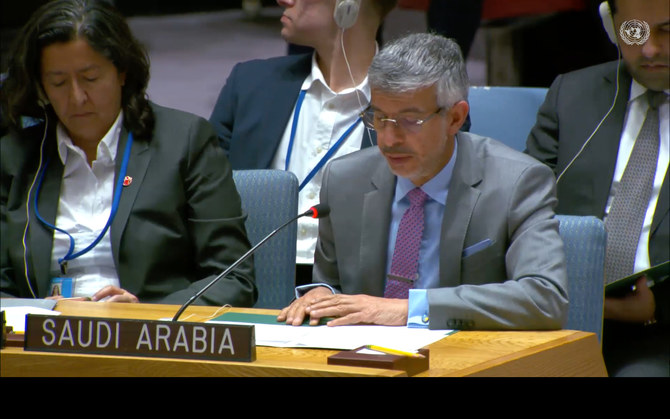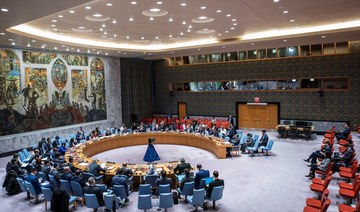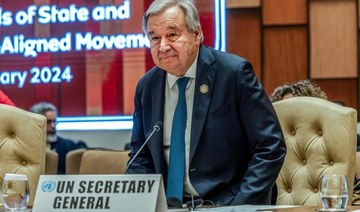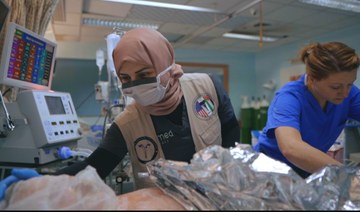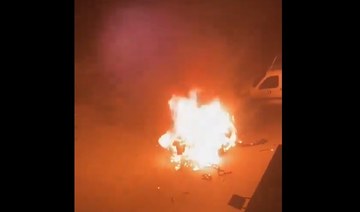NEW YORK CITY: The group of Arab countries at the UN on Friday called on the Security Council to invoke Chapter 7 of the UN Charter, to force Israel to implement an immediate ceasefire in Gaza for the remainder of Ramadan and allow humanitarian workers to freely distribute aid and prevent a looming famine in the territory.
The council recently adopted a resolution calling for a ceasefire during the Muslim holy month. This followed two separate resolutions demanding that Israeli authorities lift restrictions on humanitarian workers and allow the delivery of aid to the starving population of the enclave at the scale needed to address the growing crisis there.
Security Council resolutions are backed by the force of international law and therefore are legally binding. Chapter 7 of the UN Charter grants the Security Council the power to order military action and nonmilitary measures, such as sanctions, to ensure its resolutions are implemented and to “restore international peace and security.”
Abdulaziz Al-Wasil, the permanent representative of Saudi Arabia to the UN and the chair of the Arab Group for the month of April, said: “The Arab Group calls upon this Council to adopt a resolution, under Chapter 7 of the UN Charter, to ensure that Israel, the occupying power, would abide by a ceasefire, and to give access to humanitarian aid and put an end to the evil aggression on the Palestinian people and provide protection for them.”
His comments came during an emergency meeting of the Security Council, called for by Algeria with the support of Guyana, Switzerland and Slovenia, to discuss the risk of famine in Gaza and attacks by Israeli forces on humanitarian aid workers.
Seven people working for food-relief charity World Central Kitchen were killed in central Gaza on Monday when the Israeli military attacked their three-vehicle convoy, on which their organization’s logo was clearly displayed.
Al-Wasil condemned this “war crime” in “the strongest terms,” and called for Israeli authorities to be held accountable for it.
“The entire world was shocked by the attack,” he added. “There is no doubt that this incident is simply more evidence to be added to the record of the violations perpetrated by the Israeli occupying power against humanitarian aid workers.
“The total number of victims among humanitarian workers has reached a number that we can no longer remain silent over, as an international community. This is a dangerous precedent that violates all international rules and customs and charters.”
He said that those who were killed had “sacrificed their lives to serve innocents that are confronting the danger of death because they are being systematically starved, and because this starvation is being used as a weapon in this crisis, as the Israeli occupation continues to close crossings and prevent the entry of food, water, medicine and fuel, and it targets Palestinian citizens when they attempt to reach food aid.”
As he called for an international investigation into the incident, Al-Wasil added: “This massacre is further damning evidence of the genocide that the Israeli occupying government is pursuing in its military operations in Gaza.”
Save the Children chief Janti Soeripto told the council: “If I were to sit here and read the name and age of every Israeli and Palestinian child who died on and after Oct. 7, it would take me over 18 hours.”
She said 14,000 children have been killed in the past six months of war, and thousands more are missing, presumed dead and buried under the rubble.
“Children are now dying of malnutrition and dehydration in Gaza. Denied food or water by an illegal blockade, they’ve been starved to death,” Soeripto added.
She said 350,000 children under the age of 5 are at risk of starvation and added: “The world is staring down the barrel of a man-made famine. The hunger in the north is of particular concern, where people have now resorted to eating animal feed or tree leaves.”
Soeripto warned council members that “if we continue down this path — of all parties to the conflict flagrantly breaching the rules of war and international humanitarian law, zero accountability, and powerful nations refusing to use the levers of influence at their disposal — then the next set of mass deaths of children in Gaza will not be from bullets and bombs, it will be from starvation and malnutrition.”
Speaking on behalf of all humanitarian workers, Soeripto urged the council to “stop pretending that protection of civilians is prioritized here. We are overwhelmed with impediments. Human life is not being prioritized; not the lives of civilians, of children, and certainly not the lives of humanitarians. Investigation is not enough. We need action, we need change and we need it now.”
She called on council members to pass a “permanent ceasefire resolution, including robust measures to ensure compliance by parties to the conflict.” She also urged member states to “stop fueling this crisis” by selling weapons to those involved in the fighting.
Slovenia’s permanent representative to the UN, Samuel Zbogar, told the 15 members of the Security Council: “Famine is setting in in Gaza. Were we meeting in the north of Gaza today, all 15 of us would be skipping meals in the past months.
“Ten of us would go entire days and nights without eating. Half of us would be in desperate need of humanitarian aid. And finally, at least five of us would be parents to severely, acutely malnourished children,” which is a life-threatening situation “with life-long consequences.”
Starvation is being used as a weapon of war in Gaza, Zbogar warned.
“Waiting for a famine declaration will not change anything on the ground but we know what will: an immediate ceasefire; full, safe, secure and unhindered humanitarian access, in particular via land, to provide safe, nutritious and sufficient food, water and medicines; (the) restoration of health, water and sanitation services and energy provision will. The provision of adequate shelters for civilians will.”
Guyana’s ambassador, Carolyn Rodrigues-Birkett, lamented the fact that the Ramadan ceasefire order contained in the recently adopted Resolution 2728 had been “completely disregarded” while the humanitarian situation deteriorates.
“A pattern has emerged in this conflict of indiscriminate attacks on humanitarian workers and agencies, including UN agencies,” she said.
“The strategy of collective punishment that has been inflicted on the Palestinian people has incorporated starvation as a method of warfare, savage attacks on those attempting to meet the
needs of starving Palestinians, and Palestinians themselves have been fatally attacked while seeking sustenance.”



